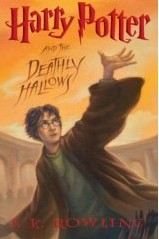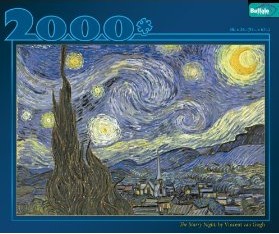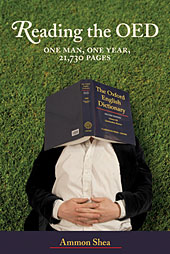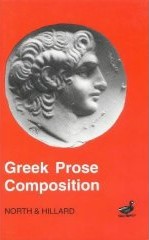Books read recently by J. Zimmerman.
Reader's Bill of Rights [after Daniel Pennac in Better than Life
from November 2003 Utne Magazine] includes the rights to:
{ June : junio (see also books on learning Spanish) 2009 }
(6.30.2009)
(6.29.2009)
(6.28.2009)
(6.27.2009)
(6.26.2009)
(6.25.2009)
(6.23.2009)
- Introduction to Reading Fiction.
- Also auditing Travis Seymour's UCSC course on
"Deception, Brain, and Behavior"
to study:
behavioral and brain manifestations of deception;
developmental changes that allow us to understand and to use deception;
physical implications of lying expressed in the face, voice, posture, and brain
activity;
mechanical and behavioral techniques used in deceptive behavior (overt behavior as well as brain activity).
(6.20.2009)
- The Five-Minute Iliad and other Instant Classics: Great Books for the Short
Attention Span
by Greg Nagan.
(6.16.2009)
- Finished
The Sin Eaters
by Andrew Beahrs.
Interesting story set in early-17th-century English Midlands, where the rural commons are being taken for
sheep enclosures, thereby impoverishing the rural communities, many of whose inhabitants
take their skills to the Virginia Colony in the New World.
The central character is Sarah, a wise, clever, and resilient elder woman.
While the plot is a little forced in places and the writing often begs annoyingly for our attention to its
florid use of metaphor,
the story of Sarah and the people that she befriends or bedevils is memorable.
(6.14.2009)
(6.12.2009)
(6.10.2009)
- Finished listening to the amazing
THE SPOKEN WORD TREASURY: 100 MODERN AMERICAN POETS READING THEIR
POEMS, VOLUME I ,
on a set of six CDs from the recordings by Luce and Arthur Klein.
Hearing the poets read their own poems makes sense of the works more deeply than reading them on the page,
and lets one then read other of their poems informed by the remembered timbres of the poet's voice.
Each poet's reading is prefaced by a commentary on their life and work.
The poets on the six CDs are:
- Masters, E. L. -- Johnson, S. -- Stein, G. -- Frost, R. -- Sandburg, C.
- Stevens, E. L. -- Bynner, W. -- Eastman, J. -- Williams, W. --
 Louis Untermeyer
(a Consultant in Poetry to the Library of Congress)
Louis Untermeyer
(a Consultant in Poetry to the Library of Congress)
- Pound, E. -- William Rose Benét -- Wheelock, J. H. -- Doolittle, H. D.
- Jeffers, R. -- Moore, M. -- Ransom, J. C. -- Eliot, T.S. --
Conrad Aiken (the first Consultant in Poetry to the Library of Congress
to be reappointed for a second term
and
Winner of 1930 Pulitzer Prize for Poetry).
- Coffin, R. P. T. -- MacLeish, A. -- Davidson, D. -- Parker, D. -- Van Doren, M. -- cummings, e.e.
- Deutsch, B. --
Louise Bogan
(a Consultant in Poetry to the Library of Congress)
-- Marshall, L. --
 Stevent Vincent Benét
(Winner of 1944 Pulitzer Prize for Poetry).
-- Cowley, M. -- Tate, A. -- Adams, L.
Stevent Vincent Benét
(Winner of 1944 Pulitzer Prize for Poetry).
-- Cowley, M. -- Tate, A. -- Adams, L.
See also:
(6.8.2009)
(6.7.2009)
- Stilt Walking at Midnight
poems
by Jonell Esme Jel'enedra.
Favorites include:
- "On the Darkest Night of the Soul We Have a Pillow Fight" (p.37)
- "Love Song and a Parade" (p.46-47)
- "What the Dawn Steals" (p.56)
(6.6.2009)
(6.5.2009)
(6.4.2009)
(6.3.2009)
(6.1.2009)
{ May : mayo (see also books on learning Spanish) 2009 }
(5.31.2009)
(5.30.2009)
(5.29.2009)
(5.27.2009)
(5.26.2009)
Day 17 of
Poetry of the Heart Course.
(5.25.2009)
- Memorial Day holiday so no
Class in Ancient Greek Course; part III.
- Finished skimming
Cliffs Notes on Greek classics
by Mary Ellen Snodgrass.
A very practical summary of Ancient Greek:
- Epic Poetry
- Drama
- Tragedy
- Comedy
- Prose Writers
- Lyric Poets
- Historians
- Philosophers
(5.22.2009)
(5.17.2009)
- A Most Wanted Man
by John LeCarré.
Fascinating novel, particularly for its portrayal of the delicate turning and handling of
people that thought they were free into collaborators,
as well as for LeCarré's contrast with the crasser measures under the CIA of
George W. Bush's presidency.
(5.21.2009)
Day 16 of
Poetry of the Heart Course.
(5.20.2009)
(5.19.2009)
Day 15 of
Poetry of the Heart Course.
(5.18.2009)
(5.17.2009)
(5.16.2009)
- Abandoned
Hand to Mouth : a Chronicle of Early Failure
by Paul Auster.
A novella-length memoir of his years as a penniless writer.
Three appendices of plays (indebted to Sam Beckett), a baseball card game, etc.
Not attention-grabbing, sadly.
See also Auster's:
(5.15.2008)
-
Finished dipping into
Modern Japanese Writers and the Nature of Literature (1976)
by Makoto Ueda.
A precursor to his
Literary and Art Theories in Japan (1998)
by this skilled author on
Bashō
and the Art of
Haiku.
Separate chapters on eight different authors, ending with the most recently born, Mishima Yukio (1925-1970),
and starting with Natsume Sōseki (1867-1916):
[pp. 5-6]
The artist, according to Sōseki,
is a person especially gifted in creating, through his mind,
a structured semblance of external reality that gives meaning to an
otherwise meaningless life.
... He first established that people have three main faculties —
intellect, emotion, and will —
and that they can be classified according to the ways in which they apply these faculties
to external reality.
He then went on to say:
"Now, those who apply intellect [in the main]
are people who elucidate the interrelationships of things;
they are labeled philosophers and scientists.
Those who apply emotion
are people who taste the interrelationships of things;
they are known as artists and men [and women] of letters.
Those who apply will
are people who improve the interrelationships of things;
they are called warriors, statesmen, beancake makers, carpenters, and so forth."
...
What he seems to have meant by it [the word taste]
was a subjective feeling of like or dislike.
... An artist ... leaves them [things] where they are and tries to understand them
through his sensibility. This enables him to represent them in a way that
involves emotion.
...
[p.9] The limitation of Sensei's [main character in his best known later novel Kokoro]
viewpoint reflects that of Sōseki,
who confined emotion to the sphere of the consciousness.
|
Skilled and detailed presentation.
(5.14.2009)
Day 14 of
Poetry of the Heart Course.
(5.13.2009)
(5.12.2009)
- From A to X: A Story in Letters
by John Berger,
a long-list nominee for the 2008 Booker Prize.
One of the best books read in 2009.
Poetic writing by A, telling (explicitly and implicitly) her political-prisoner beloved how goes the revolution.
Much is present in the silences and spaces.
A succinct review from Arundhati Roy says:
| This is a book of controlled rage sculpted with tools
of tenderness and a searing political vision. Everything he writes about is profound, precise and
invoiced: Liberty and the lack of it, hope and the lack of it, power and the lack of it, love and
the terrible yearning that takes its place when the loved one has been taken away.
|
(5.11.2009)
(5.10.2009)
- Abandoned listening to the WORST BOOK I have attempted this year:
Scott Smith's unrelentingly horrible horror novel
The Ruins (2006).
The characters are dull and silly people that deserve to meet what www.Bookslut calls
"an EVIL Machiavellian mind-reading, tourist-impersonating,
cell-phone-mimicking, blood-sucking, acid-sap-bleeding vine ... and there is
nothing worse than a plant gone bad".
Though as I was haunted by John Wyndham's
TRIFFIDS
(as in The Day of the Triffids)
in my childhood,
this villain of a localized vine just seems a little on the meek side.
I mean, come on, develop wind-borne seeds.
(5.9.2009)
(5.8.2009)
(5.7.2009)
Day 12 of
Poetry of the Heart Course.
For this session, read John Ford's Revenge Tragedy Tis Pity She's A Whore (1633);
think camp-violence-mania.
(5.6.2009)
(5.5.2009)
Day 11 of
Poetry of the Heart Course.
(5.4.2009)
(5.3.2009)
-
Finished reading
Shadow Prey (1990)
by John Sandford (Pulitzer prize-winner John Camp).
This early book (second in the series) is primarily interesting for background on the series.
Shows Detective Lucas Davenport overplaying his hand and being saved by a smart NYPD cop.
Lacks the humor of some of the later books in the series
and the insight into the mind of the psychopath is more what we see of Davenport than of
the killers he is trying to catch.
Crude in places.
Books read in this series:
(5.2.2009)
(5.1.2009)
{ April : abril (see also books on learning Spanish) 2009 }
(4.29.2009)
(4.28.2009)
Day 9 of
Poetry of the Heart Course.
(4.27.2009)
(4.26.2009)
Tales of Beedle the Bard
by JFK Rowling
with annotations by Albus Dumbledore.
Five traditional stories that show wizards and witches working to help Muggles,
the fifth story being the one that was a key in
Harry Potter and the Deathly Hallows.
|

|
(4.25.2009)
- Finished The Founding Fish
by John McPhee.
This was a fascinating introduction to the skills and challenges and history of shad fishing,
about a fish that nourished most of the early Europeans in north america.
I am especially heartened by his setting the story straight about the pain and stress caused to fish and often irrecoverable
damage to the fish caused by the nasty 'catch and release' program.
(4.24.2009)
(4.21.2009)
Day 7 of
Poetry of the Heart Course.
(4.20.2009)
(4.19.2009)
- Abandoned skimming Angelica
by Arthur Phillips.
A scary little story where there are as many versions of the story as there are tellers and readers.
(4.18.2009)
- Abandoned dipping into
The Best American Short Plays 2004-2005
edited and introduced by Barbara Parisi.
Some are ok but most do not come off the page convincingly.
(4.17.2009)
(4.16.2009)
Day 6 of
Poetry of the Heart Course.
(4.15.2009)
INCOME TAX DAY, SIGH.
(4.14.2009)
Day 5 of
Poetry of the Heart Course.
(4.12.2009)
- Finished listening to the amazing
THE SPOKEN WORD TREASURY: 100 MODERN AMERICAN POETS READING THEIR
POEMS, VOLUME II ,
on a set of six CDs from the recordings by Luce and Arthur Klein.
Hearing the poets read their own poems makes sense of the works more deeply than reading them on the page,
and lets one then read other of their poems informed by the remembered timbres of the poet's voice.
Each poet's reading is prefaced by a commentary on their life and work.
The poets on the six CDs are:
- Winters, Y. -- Williams, O. -- Hughes, L. -- Spencer, T. -- Nash, O. -- Cullen, C.
- Moore, M. -- Holmes, J. -- Eberhart, R. -- Warren, R. P. -- Kunitz, S. -- Rexroth, K.
- Auden, W. H. -- Roethke, T. -- Engle, P. -- Scott, W. T. --
Bishop, E. -- Cunningham, J.V.
- Patchen, K. -- Everson, W. -- Sobiloff, H. -- Shapiro, K. -- Nims, J. F. --
Schwartz, D. (sadly, a pretentious reading
with a child-like intonation rising occasionally to a pretense of anger).
- Rukeyser, M. -- Howes, B. --
Jarrell, R. (self-assured, down-putting, and snippy) --
Berryman, J. (one-time poetry pop star) --
Dodson, O. -- Garrigue, J. (one of the best in this set:
meditation on love and nature, often using classical and metaphysical tropes).
- Stone, R. -- Summers, H. -- Ciardi, J. -- Viereck, P. -- Brinnin, J. M. --
Lowell, R.
See also:
(4.11.2009)
(4.10.2009)
(4.9.2009)
Day 4 of
Poetry of the Heart Course.
(4.8.2009)
(4.7.2009)
Day 3 of
Poetry of the Heart Course.
(4.6.2009)
(4.5.2009)
- Finished dipping into The Spartans
by L. F. Fitzhardinge, in part as background related to
Ancient Greek Course; part III.
By starting with the actual evidence in ceramics, bronze and lead artifacts, sculpture, and so on,
Fitzhardinge presents a compelling argument that the traditional image of the relative austerity
and militarism of the Spartans is mainly a result of propaganda that originated with the Spartans.
From Fitzhardinge, it appears that the Spartans shared many of the attributes of the people of
Athens and other power centers in the mid-millennium B.C.E.
(4.4.2009)
(4.3.2009)
(4.2.2009)
(4.1.2009)
 Links.
Links.
 Booker Prizes
Booker Prizes
 Chocolate.
Chocolate.
 Books read
Books read
 Best books read in 2009.
Best books read in 2009.
 Best writers of poetry and prose
Best writers of poetry and prose
 Harry Potter;
also
Harry Potter en Español.
Harry Potter;
also
Harry Potter en Español.
 New books on Christianity and Spirituality
New books on Christianity and Spirituality


 Why read a book?.
Why read a book?.
 The Mental Health of George W. Bush
The Mental Health of George W. Bush





